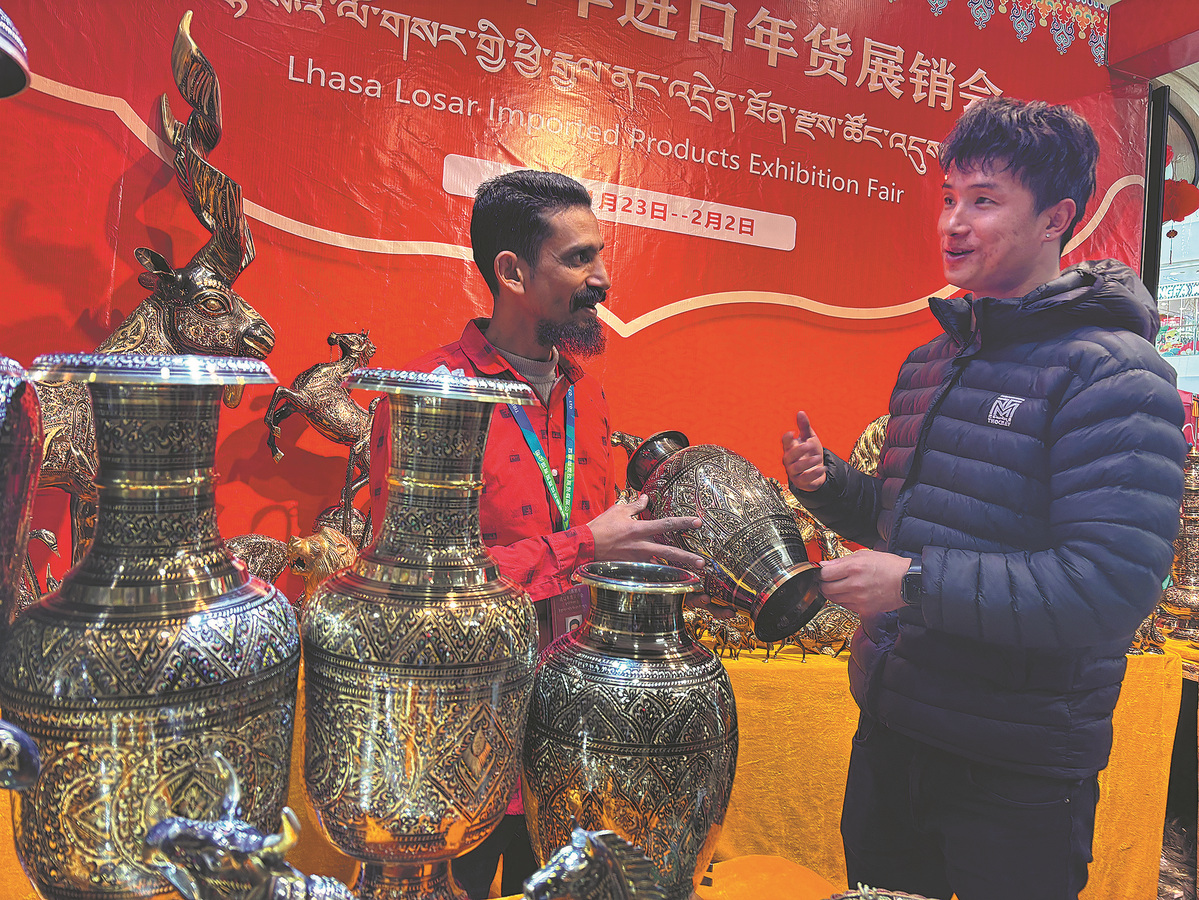
A stall selling bronze wares from Pakistan at the imported goods fair inside the Gakyiling Plaza Shopping Mall in Lhasa, Xizang autonomous region on Thursday. PALDEN NYIMA/CHINA DAILY
An imported products fair kicked off on Thursday in Lhasa, the capital of the Xizang autonomous region, featuring non-staple Russian food, medicine from Thailand, Nepalese handicrafts, bronze artifacts from Pakistan and Afghan carpets.
The fair, which opened on Jan 23, is being hosted by Xizang Kakila Trading Co Ltd and will continue through Feb 1 at the Gakyiling Plaza Shopping Mall, allowing locals to purchase imported goods to meet their Lunar New Year shopping needs.
The varieties of products are abundant. The products of Nepal mainly include Buddha statues, thangka paintings and various handicrafts, while the products of Bhutan are mainly fabrics, incense sticks and traditional medicine.
The products from Pakistan include bronze ornaments and jade products, while those from Afghanistan include silk products, tapestries and carpets.
Despite Thursday being the first day of the fair, the Gakyiling Plaza Shopping Mall was crowded and bustling as locals have been busy visiting the markets to celebrate Spring Festival and the Tibetan Sonam Losar.
This year, the Spring Festival falls on Jan 29 and the Tibetan Sonam Losar New Year falls on Jan 30, the streets of the regional capital Lhasa are alive with a festive atmosphere as celebrations draw near.
Sonam Jampal, general manager of Xizang Kakila Trading Co Ltd, said due to the efforts made by government institutions, including the Lhasa commerce bureau, such import fairs have been held eight times in different areas of Xizang in the last few years, creating good platforms for local residents to consume imported goods.
"The varieties of goods have become more abundant with more merchants from more countries becoming involved in the fairs in recent years, providing more shopping choices for the locals," said Sonam Jampal.
According to the company, 62 foreign merchants are participating in the fair, with over 60 stalls operational, and the company has arranged 10 employees to serve the foreign merchants, including providing meals, transporting products and providing interpretation services for them.
"Apart from the exported products of Russia and Thailand which are sold by Chinese merchants, all the other imported goods are sold by foreign merchants," he said, adding that this differs from the previous imported goods fairs which mainly drew merchants only from Nepal and Bhutan. This year, the ongoing fair has attracted merchants from Pakistan and Afghanistan as well.
"The event not only provides business opportunities for foreign merchants but also highlights Xizang's growing role as a hub for economic engagement with South Asia and beyond, and I hope international enterprises from the West will join such fairs in the future," Sonam Jampal said.
Danish Ghani, a merchant from Pakistan, said that it's his first time to do business in Lhasa and he is pleased that many locals liked his bronze handicrafts. He said that he had a positive start to the fair on Thursday and expects the good business to continue in the following days.
Feng Fei, an agent selling various Russian products at the fair, said he did not regret traveling nearly 4,800 kilometers from Heilongjiang province to Xizang to attend. He sells Russian-made products such as honey, chocolate, candy, sausages and beverages.
"It's my third time to participate at an imported goods fair in Lhasa, the best sold products are honey, coffee and milk powder. Many local residents like our Russian products, and many even pre-order the items they like the most," said Feng.
According to latest statistics released by the region's statistics bureau on Tuesday, foreign trade in the region grew last year, with the total import and export volume hitting 12.67 billion yuan ($1.75 billion), up 15.4 percent year-on-year. Exports accounted for 11.32 billion yuan, a rise of 15.3 percent, while imports climbed 16.9 percent to 1.35 billion yuan.
palden_nyima@chinadaily.com.cn